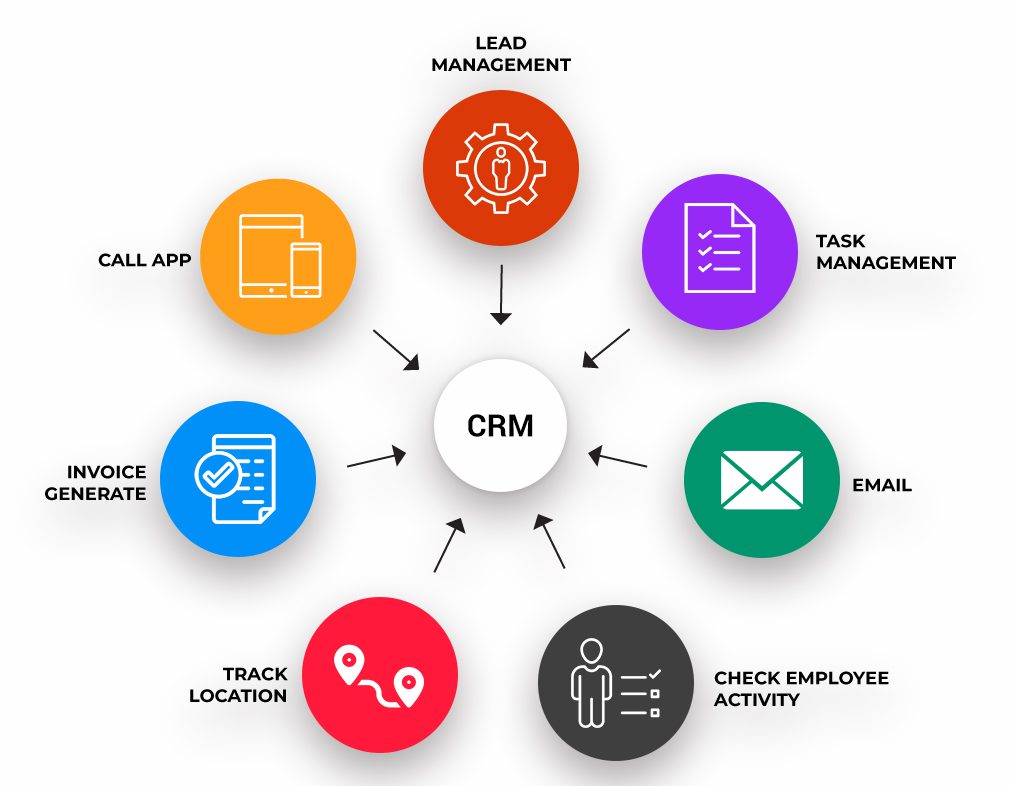Exploring CRM Solutions: A Comprehensive Guide
Embark on a journey through the world of CRM solutions, where businesses find innovative ways to enhance customer relationships and streamline operations. From different types to customization options, this guide covers everything you need to know about CRM solutions.
In the following sections, we delve into the implementation, customization, and integration aspects of CRM solutions, shedding light on best practices and key considerations for success.
Types of CRM solutions

CRM (Customer Relationship Management) solutions come in various types to cater to different business needs. Here are some of the common types of CRM solutions available in the market:
1. Operational CRM
Operational CRM focuses on streamlining business processes related to customer interactions. It includes features such as sales automation, marketing automation, and service automation. Popular examples of Operational CRM solutions include Salesforce, Zoho CRM, and HubSpot CRM.
2. Analytical CRM
Analytical CRM focuses on analyzing customer data to improve business strategies and decision-making. It helps in understanding customer behavior and preferences. Examples of Analytical CRM solutions are Microsoft Dynamics 365, Oracle CRM, and SAP CRM.
3. Collaborative CRM
Collaborative CRM emphasizes communication and collaboration with customers across various channels. It helps in enhancing customer engagement and relationship building. Some popular Collaborative CRM solutions include Nimble, Pipedrive, and Freshsales.
Cloud-based CRM Solutions
Cloud-based CRM solutions are becoming increasingly popular due to their flexibility, scalability, and cost-effectiveness. These solutions are hosted on remote servers and accessed through the internet. Key features of cloud-based CRM solutions include real-time data access, automatic updates, and easy integration with other business tools.
The benefits of using cloud-based CRM solutions include reduced IT costs, improved data security, and enhanced mobility for remote teams.
Implementation of CRM solutions

Implementing a CRM solution for a business involves several key steps that are essential for a successful deployment. It is important to carefully plan and execute each stage to ensure the system meets the needs of the organization and its customers.
Steps involved in implementing a CRM solution:
- Assess business needs and objectives: Understand the specific requirements of the organization and what goals they aim to achieve with the CRM system.
- Select the right CRM software: Choose a CRM solution that aligns with the business needs and is scalable for future growth.
- Customize and configure the CRM system: Tailor the software to meet the unique processes and workflows of the organization.
- Provide training and support: Educate employees on how to use the CRM system effectively and offer ongoing support for any issues that may arise.
- Integrate with existing systems: Ensure seamless integration with other software and tools used by the business to maximize efficiency.
- Test the system: Conduct thorough testing to identify any issues or bugs before full implementation.
- Deploy the CRM solution: Roll out the system across the organization in phases to minimize disruptions and ensure a smooth transition.
- Monitor and evaluate performance: Track key metrics and feedback to measure the success of the CRM implementation and make necessary adjustments.
Best practices for successful CRM solution implementation:
- Involve stakeholders from all departments in the planning process to ensure buy-in and alignment with business goals.
- Set clear objectives and timelines to keep the implementation on track and measure progress effectively.
- Provide comprehensive training to all users to maximize adoption and utilization of the CRM system.
- Regularly communicate updates and progress to keep employees engaged and informed throughout the implementation process.
- Establish a dedicated project team to oversee the implementation and address any issues that may arise promptly.
Challenges faced during the implementation of on-premise vs cloud-based CRM solutions:
- On-premise CRM solutions often require significant upfront costs for hardware, software, and maintenance, compared to the lower initial investment for cloud-based solutions.
- Cloud-based CRM solutions offer greater flexibility and scalability, making it easier to adapt to changing business needs compared to the more rigid structure of on-premise solutions.
- Data security and privacy concerns may be more pronounced with on-premise solutions, as organizations are responsible for managing and securing their data, whereas cloud-based solutions offer built-in security measures provided by the vendor.
- Customization and integration capabilities may vary between on-premise and cloud-based CRM solutions, impacting the ability to tailor the system to specific business requirements.
Customization of CRM solutions
Customizing CRM solutions is crucial for businesses to tailor the software to meet their specific needs and workflows. By customizing CRM solutions, companies can ensure that the software aligns with their unique processes, data requirements, and user preferences, ultimately enhancing productivity and efficiency.
Customization Options in CRM Software
- Custom Fields: CRM software allows users to create custom fields to capture specific data points that are relevant to their business. For example, a company can create custom fields to track unique customer preferences or industry-specific information.
- Workflow Automation: Businesses can customize CRM workflows to automate repetitive tasks, such as sending follow-up emails, assigning leads to sales reps, or updating customer records. This helps streamline processes and improve overall efficiency.
- Integration Capabilities: CRM solutions offer integration options with other software applications, allowing businesses to connect CRM data with tools like marketing automation platforms, accounting software, or e-commerce platforms for a seamless flow of information.
- User Permissions and Access Control: Companies can customize user roles and permissions within CRM systems to control access to sensitive data and functionalities. This ensures data security and compliance with privacy regulations.
Impact of Customization on CRM Success
Customization plays a significant role in driving user adoption and overall CRM success. When CRM solutions are tailored to fit the specific needs and preferences of employees, they are more likely to embrace the software and use it effectively. This leads to higher user satisfaction, increased productivity, and improved data accuracy within the CRM system.
Ultimately, customization helps businesses maximize the value they derive from their CRM investments.
Integration with other systems

Integrating CRM solutions with other business systems is crucial for streamlining processes, enhancing data accuracy, and improving overall efficiency. By connecting CRM with various tools and software, businesses can achieve a more comprehensive view of their customers and operations.
Common Integration Points for CRM Solutions
- Email Marketing Tools: Integrating CRM with email marketing platforms allows businesses to create targeted campaigns based on customer data stored in the CRM system.
- Accounting Software: Connecting CRM with accounting software enables seamless invoicing, payment tracking, and financial reporting for a more holistic view of customer interactions and transactions.
- Customer Support Systems: Integration with customer support systems ensures a smooth transition of customer inquiries, complaints, and feedback between departments, leading to improved customer satisfaction.
Successful CRM Integration Strategies and Benefits
- Example 1: Integration with E-commerce Platforms - By integrating CRM with e-commerce platforms, businesses can track customer behavior, purchase history, and preferences to personalize marketing efforts and improve sales conversions.
- Example 2: Integration with Social Media Platforms - Connecting CRM with social media platforms enables businesses to monitor customer interactions, gather feedback, and respond promptly to inquiries, enhancing brand reputation and customer engagement.
- Example 3: Integration with Marketing Automation Tools - Integrating CRM with marketing automation tools streamlines lead generation, nurturing, and conversion processes, improving marketing ROI and overall sales performance.
Final Review
In conclusion, CRM solutions serve as powerful tools for businesses seeking to optimize customer interactions and drive growth. By understanding the various facets of CRM implementation and customization, companies can unlock new opportunities and achieve lasting success in today's competitive landscape.
General Inquiries
How important is customization in CRM solutions?
Customization plays a crucial role in tailoring CRM systems to fit specific business requirements, enhancing user adoption and overall success.
What are some common integration points for CRM solutions?
CRM solutions often integrate with email marketing tools, accounting software, and customer support platforms to streamline operations and improve efficiency.
What are the key benefits of cloud-based CRM solutions?
Cloud-based CRM solutions offer scalability, flexibility, and remote access, making them ideal for businesses of all sizes looking to modernize their customer management processes.
How can businesses ensure successful CRM solution implementation?
Businesses can ensure successful CRM implementation by defining clear objectives, training staff effectively, and continuously monitoring and adjusting processes to meet evolving needs.